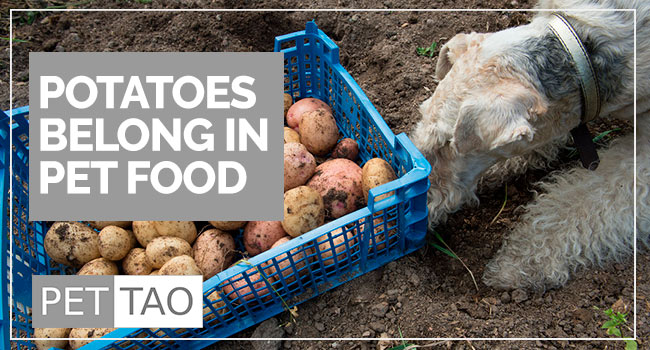What a great question!
Well, first of all, potatoes are a healthy, fat-, sodium- and cholesterol-free source of carbohydrates!
Potatoes are a Complex Carbohydrate Source
Potatoes are a nutrient-rich source of complex carbohydrates, making them a welcome addition to your pet’s diet!
Although potatoes have a reputation as “high carb,” and thus “bad for your pet,” it is not true!
Potatoes are actually low on the Glycemic Index.
Low Glycemic Index
The Glycemic Index (GI) ranks carbohydrates on a scale from one to 100. The scale shows the speed of digestion.
For example, pure glucose scores 100.
Lower glucose foods are slower to digest.
Potatoes are wrongly classified as high on the GI, according to a study in the British Journal of Nutrition.
The research showed the GI of potatoes varies depending on the type, where it grows and the preparation.
For example, boiled potatoes consumed whole instead of mashed have a medium to low GI. Potatoes eaten cold instead of hot also have a lower GI.
Combining potatoes with foods containing fat, acid, fiber, and protein also lowers the overall GI.
PET | TAO’s formulas combine potatoes with meat, vegetables and other nutritious foods, providing your pet with a complete and balanced diet.
The high meat content in PET | TAO formulas lowers the GI of white potatoes.
Potatoes are Energetically Neutral
Potatoes are energetically neutral, according to Traditional Chinese Medicine (TCM), the basis for Traditional Chinese Veterinary Medicine (TCVM).
Balanced Yin and Yang
Energetically neutral foods tonify Qi and Blood. Neutral foods also harmonize Yin and Yang.
Potatoes are Nutritious
Potatoes and their skins are chock-full of nutrients. You overlook nutrients when you fall prey to high GI rumors.
High in Vitamin C
Potatoes are high in Vitamin C. In fact, a medium potato with skin provides about 27mg of Vitamin C.
The recommended daily dose of Vitamin C for a healthy 28lb dog is approximately 500mg.
B Vitamins
Potatoes are high in B Vitamins, particularly Vitamin B6.
B vitamins protect arteries.
Vitamin B6 reduces levels of a molecule called homocysteine. High homocysteine levels cause inflammation of the arteries.
Minerals
White potatoes are a good source of minerals such as potassium, magnesium and iron.
In fact, white potatoes have more potassium than bananas!
Kukoamines
In TCvM, the Lycium chinense plant is used in a tea to lower blood pressure. Lycium chinense contains kukoamines, a blood-pressure lowering molecule.
Research from the Institute for Food Research in Norwich shows potatoes also contain kukoamines.
Additionally, the Agricultural Research Service in Navarre, America, recently found 60 different types of phytochemicals and vitamins in potato skins.
Many of these were flavonoids, which help protect against cardiovascular disease by lowering levels of bad LDL-cholesterol and keeping arteries fat-free.
Potatoes are a Better Carbohydrate Source than Tapioca
Tapioca is a starch extracted from the cassava root.
Some dog food companies use tapioca as a carbohydrate substitute for grains.
However, tapioca is nutritionally poor.
Tapioca has a high carbohydrate concentration, resulting in high blood sugar when the starch converts to sugar during digestion.
In fact, the sugar concentration of tapioca is second only to sugar cane.
High levels of sugar are toxic to carnivores, such as dogs, over time.
Potatoes Provide a Grain-free Alternative to Rice
Potatoes are overall more nutritious than rice.
Furthermore, some dogs are allergic to grains. The most common food allergies in pets are dairy, wheat and beef.
Symptoms of food allergies include:
- Excessive scratching or licking
- High frequency of hot spots
- Dry itchy skin
- Bald patches
- Skin infections
- Ear infections
- Vomiting
- Diarrhea.
Potatoes and Glycoalkaloids
Potatoes first received a bad rap due to their glycoalkaloid content.
Glycoalkaloids, neurotoxins, can appear in stems, shoots and green parts of potato skin.
However, the regular brown skin of potatoes, as well as the flesh, do not contain any glycoalkaloids or toxins.
Research and Potatoes
Scientists discovered at least 60 different vitamins and phytochemicals including, flavonoids, in a test of more than 100 white potato varieties, according to the USDA’s Agricultural Research Service.
Flavonoids support immunity and heart health, and may protect against some types of cancer.
In Healing with Whole Foods, Paul Pitchford describes how white potatoes neutralize body acids and reduce some causes of inflammation.
Does your pet’s food contain:
- Potatoes?
- Rice?
- Tapioca?
Comment below and let us know!








